Most marketing strategies are all about generating massive amounts of leads and moving them down the funnel to be nurtured until a fraction of them become clients. The idea is to have a maximum of viable audience exposed to your message and hope they find what they need in your products, right? This approach has been proven to be efficient over time and many companies have built their business around it. But there is more than one road to success. If done right, an alternative like account-based marketing can be one of the most advantageous marketing strategies out there, delivering impressive ROI.
But what is Account-Based Marketing?
What Is Account-Based Marketing?
Account-based marketing (ABM) is a holistic marketing approach where a company focuses on one or a few high-end accounts, rather than on a mass strategy. The sales and marketing departments work together to research the target-customer’s business specifics, pain points, and needs, and build a personalized ABM campaign strategically designed to win them over as a client.
Types of Account-Based Marketing
There are, generally two types of account-based marketing, depending on the scope and goals of the campaign:
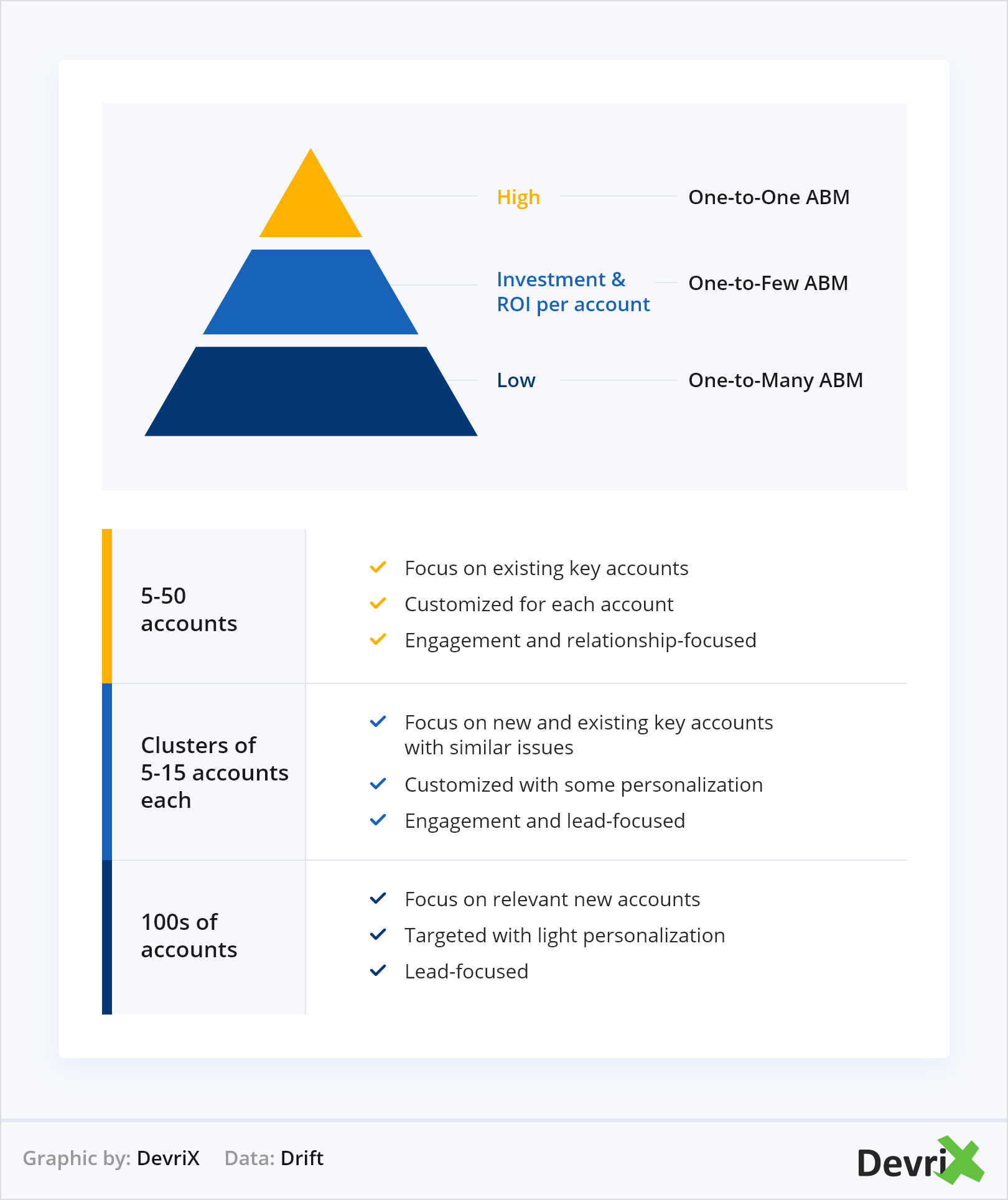
- One-to-One ABM. In this type of ABM, you build a whole marketing strategy to target a single account. It’s usually a large company that matches your ideal customer profile perfectly and has the potential to bring in sufficient revenue.
- One-to-Few ABM. This strategy is to an extent equivalent to the previous one, with the important difference that you target a number of companies with similar profiles and requirements.
- One-to-Many ABM. Account-based marketing can also be done at scale, but, as seen in the graphic, the ROI progressively decreases the higher the number of targeted accounts becomes.
Which type of ABM you should choose depends on the products and services you provide and the profiles of your buyers. If you typically target very similar clients, the second option can save resources and still deliver satisfying results.
However, one of the most important benefits of account-based marketing is personalization. So make sure that by trying to widen your scope, you are not defying the purpose of ABM.
Read on to find what other advantages ABM can offer your company and how to successfully implement them in your marketing strategy.
Benefits of Account-Based Marketing
Account-based marketing is a resourceful B2B strategy that can deliver long-term results and help you grow your business and increase revenue.
As mentioned, it relies on extreme personalization and thorough market research. When done properly, it can be a recipe for successful business growth.
Here are some of the most prominent benefits it can provide:
1. Efficient Use of Resources
In a mass-oriented marketing strategy, you stretch your resources to cover more ground. The goal usually is to attract a broader audience in order to make sure that enough leads will shift to the bottom of the funnel and become customers. This diversity of prospects complicates the sales process. As a result, your marketing team invests more effort into making its message a one-fits-all. At the same time, the sales team doesn’t waste precious time contacting unqualified leads.
Account-based marketing, on the other hand, is a team effort. It requires close collaboration between your sales and marketing departments and unites them with common goals.
By joining forces, both teams improve their efficiency and adjust their strategy based on the input of their coworkers. Sales share their deeper knowledge of the client’s actual needs and pain points, and marketing delivers higher-quality leads.
Also, when you are focusing on specific accounts, you feed into the funnel only qualified leads. This simplifies the nurturing process and reduces the resources needed to move customers down the funnel.
2. Increased ROI
For businesses that are used to traditional marketing, ABM might seem like an unreasonably large investment of money, time, and manpower. After all, what we are talking about here is hours of market analysis and client research, and pivoting the work of more than one department around a fist-full of clients. Naturally, the first question to ask will be – does it really pay off?
According to an ITSMA survey on B2B account-based marketing, 84% of companies who employ ABM say it delivers higher ROI than any other marketing strategy. And as marketers, we know that return on investment (ROI) is a metric that can show the true efficiency of a strategy and, basically, let you know if it’s worth it.
Focusing on highly targeted accounts means that your teams can be more productive, their work can be more satisfying, as a result, a larger percentage of leads can become clients. After all, you are strategically researching what the customer needs in order to show them exactly how your product can provide solutions to their pain points. If you’ve done a good job, there is almost no reason why the client won’t at least consider your offer.
3. Better Personalization
What makes account-based marketing so successful and efficient for businesses is the extreme personalization of the ABM campaigns. Businesses using the strategy report up to 93% engagement, 59% increase in open rates, and 29% improvement in reply rates.
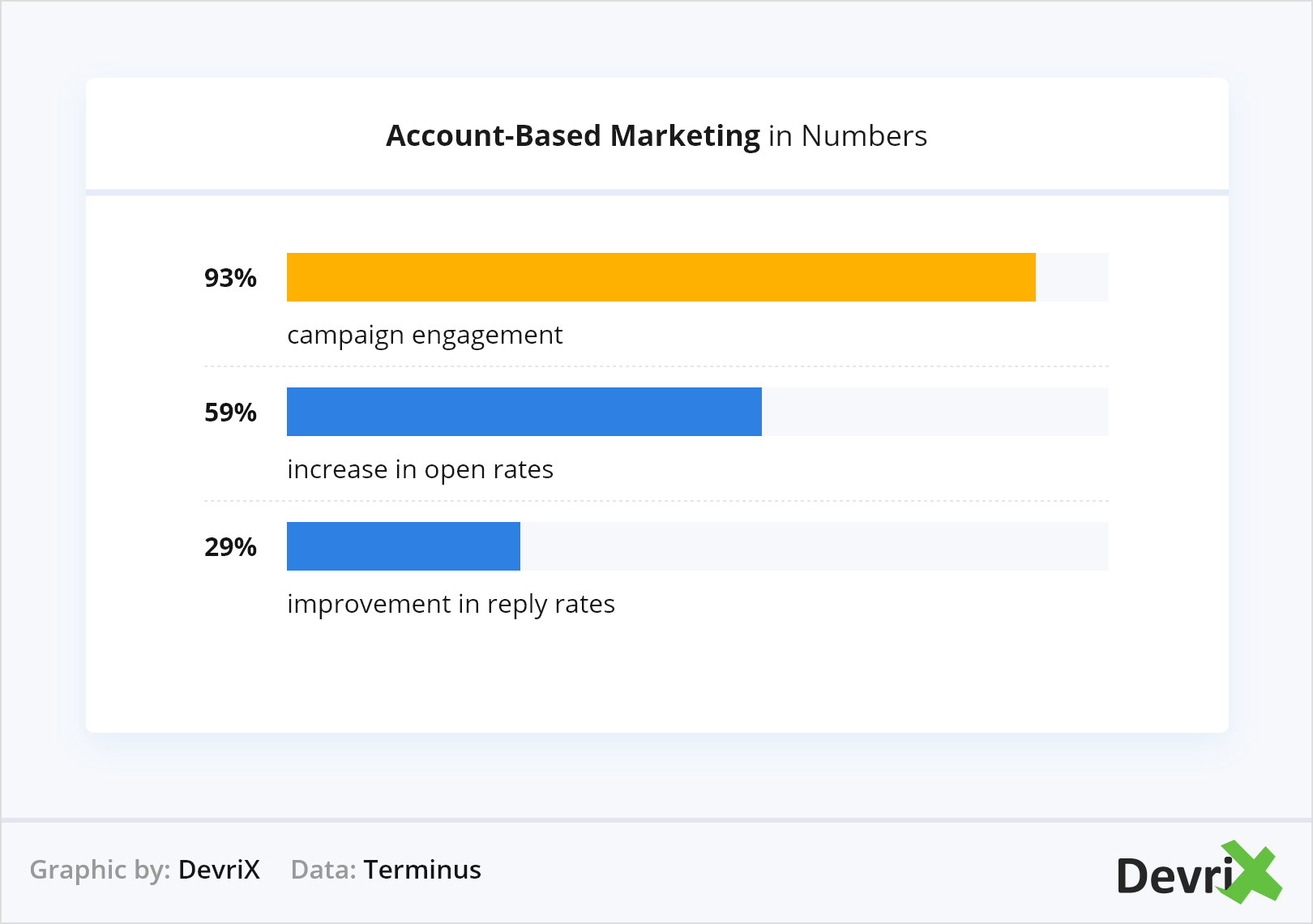
Knowing who your customers are, allows you to personalize your campaign and dedicate it exactly to their specific needs and business requirements.
Also, as mentioned, when marketing and sales are aligned, their productivity drastically improves. This allows them to know the customer better, to improve their working strategy in real-time, and make adjustments to meet the client wherever they are on their journey.
4. Well-Optimized Funnel
In traditional lead generation, your funnel is broad at the top and narrow at the bottom. In such an arrangement, the marketing department is responsible for the top of the funnel and the sales reps are in charge of the bottom.
In order to provide enough opportunities for the sales team to seal deals, your marketing team should focus on feeding into the funnel as many leads as possible. The number of prospects who reach the final stages of the journey will be far less than the ones who enter it.
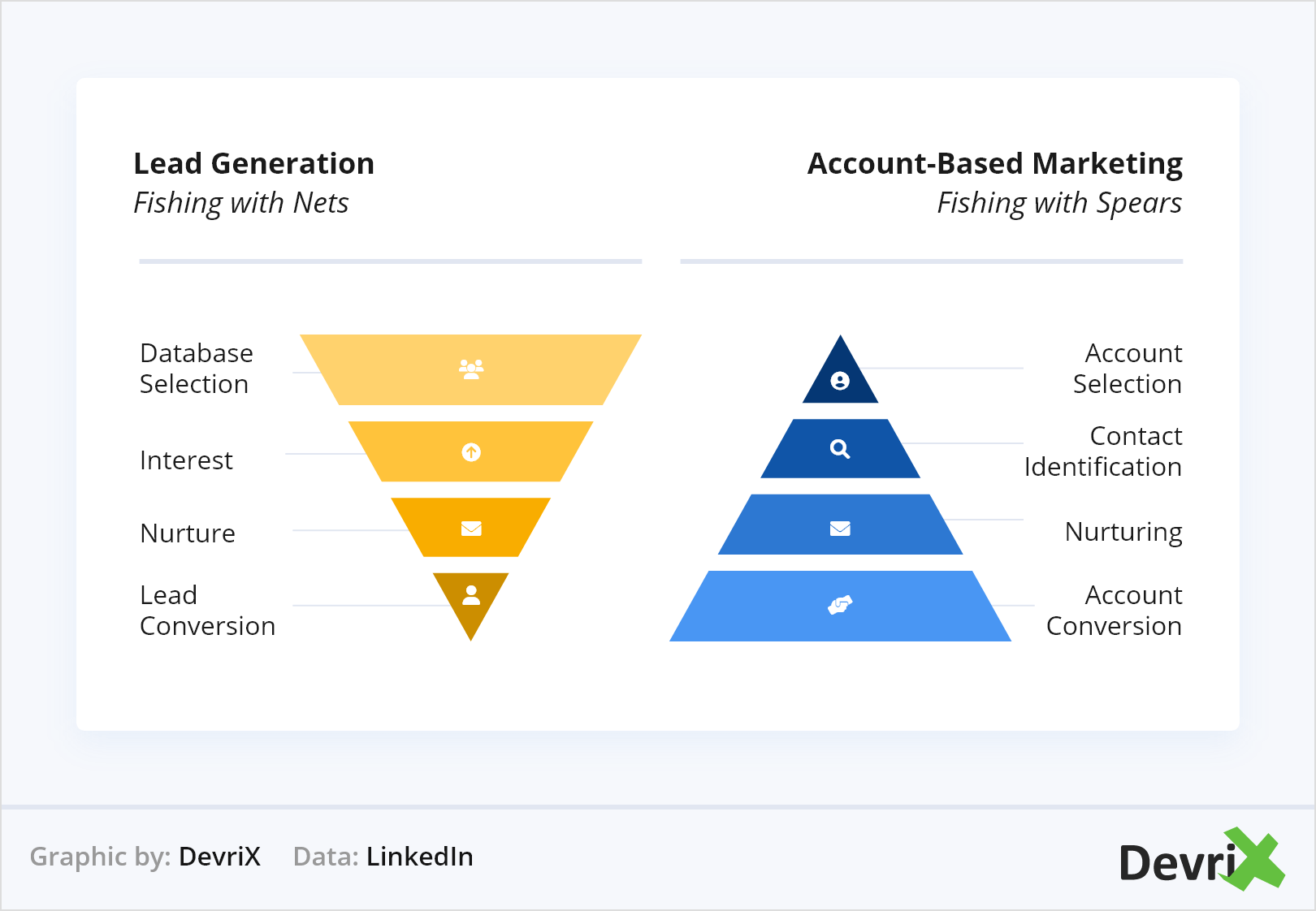
However, as mentioned, in account-based marketing, both teams work together. They ensure that every stage of the customer journey is optimized to deliver a personalized experience and convert prospects into clients.
Marketing and sales collaborate to confirm that each prospect who enters the funnel is highly qualified, and their needs can be accurately addressed regardless of the stage of consideration they are in.
5. Shorter Customer Lifecycles
The collaboration of teams to move leads down the funnel smoothly usually makes the customer lifecycle shorter.
When a customer is targeted with the right message at every stage of their journey, this will significantly reduce the time they need to make a decision.
In B2B, the buyer is rarely a single person. The decisions are usually made by a board of stakeholders who all need to be familiar with the information to be on board with the sale. And here lays one of the major advantages of account-based marketing, it targets – as the name implies – whole accounts. This means that the one who receives the information is not only the contact you have, a.k.a. the lead, but the whole board of decision-makers.
When the time comes for a decision to be made, the whole account has already been exposed to your content and is already in the loop. This can cut the customer lifecycle significantly shorter and fast-forward the sales process.
6. Happier Clients
One of the reasons account-based marketing delivers such impressive results is because it’s all about the client. You pivot your whole strategy around their business specifics, their needs, and their pain points.
And this doesn’t stop once the lead becomes a customer. ABM is a long-term investment and involves re-selling, cross-selling and upselling as the next steps of your B2B relationship. By focusing your attention on the details and keeping ongoing communication, you learn a lot about the customer and are able to provide a truly personalized, top-notch experience.
Clients who receive such attention and tailor-made services know that they will have their needs met by your company and have no reason to leave. And this, in a few words, means that ABM is a way to make your clients happy and future-proof your business.
7. Accurate Conversions Measurements
One of the most important parts of every campaign is conversion measurement. Analyzing the performance of different marketing channels provides you valuable insight into the efficiency of your strategy. It allows you to monitor results, and determine the ROI and revenue they account for. This way you can make adjustments to your strategy, redistribute resources and optimize your spending.
Since account-based marketing is extremely targeted, keeping track of conversions is much easier to accomplish. You can better understand the customer’s journey across channels and identify the most lucrative touchpoints they have with your business.
Conversion measurement for account-based marketing delivers data with supreme accuracy and allows you to fine-tune your sales and marketing strategy.
8. Improved Engagement
Creating content that is engaging and interesting to your customers is not an easy task. But with account-based marketing, your content is targeted to match exactly the needs of your clients and to provide actionable solutions to their individual problems.
By focusing on specific accounts, you can optimize your content creation efforts and tailor it to the client. And, presuming you deliver value, high-quality, and expertise, your customers will naturally be more engaged. Why wouldn’t they be, you are offering exactly what they need.
Recap
Account-based marketing is an efficient marketing strategy that can deliver impressive ROI and help you build a network of highly profitable clients.
Of course, no strategy can be a guarantee for success in itself. But by focusing on high-end lucrative accounts that can benefit from your services, and doing comprehensive preliminary research, you set the base for a smooth ride through the funnel and a successful long-term partnership.
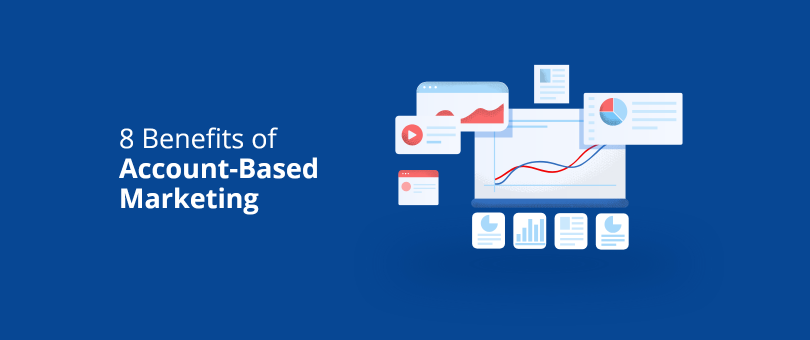


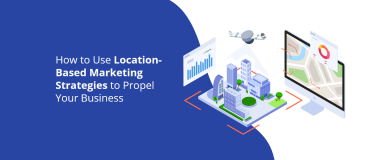
![Influencer Marketing Statistics Every Business Should Know [Infographic]](https://devrix.com/wp-content/uploads/2019/10/Influencer-Marketing-Statistics-Every-Business-Should-Know-Infographic@2x-380x160.png)

